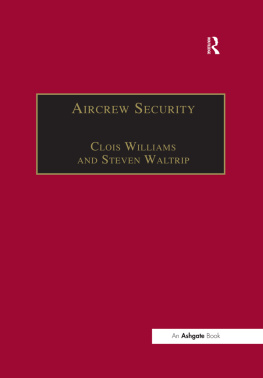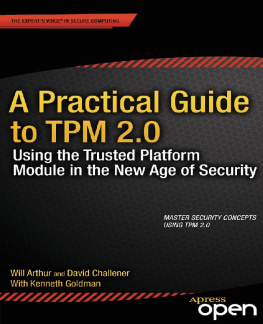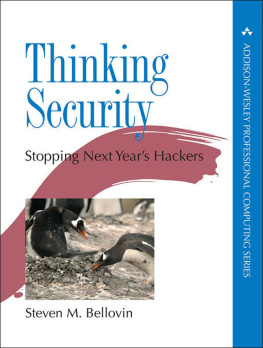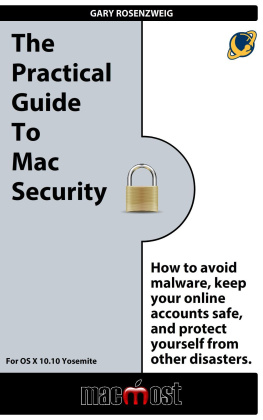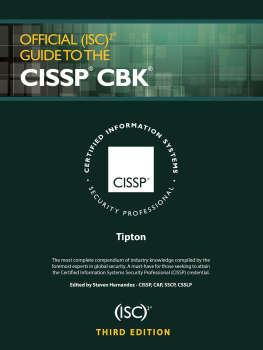Waltrip Steven - Aircrew Security A Practical Guide
Here you can read online Waltrip Steven - Aircrew Security A Practical Guide full text of the book (entire story) in english for free. Download pdf and epub, get meaning, cover and reviews about this ebook. City: Florence, year: 2017, publisher: Taylor and Francis, genre: Religion. Description of the work, (preface) as well as reviews are available. Best literature library LitArk.com created for fans of good reading and offers a wide selection of genres:
Romance novel
Science fiction
Adventure
Detective
Science
History
Home and family
Prose
Art
Politics
Computer
Non-fiction
Religion
Business
Children
Humor
Choose a favorite category and find really read worthwhile books. Enjoy immersion in the world of imagination, feel the emotions of the characters or learn something new for yourself, make an fascinating discovery.
- Book:Aircrew Security A Practical Guide
- Author:
- Publisher:Taylor and Francis
- Genre:
- Year:2017
- City:Florence
- Rating:3 / 5
- Favourites:Add to favourites
- Your mark:
- 60
- 1
- 2
- 3
- 4
- 5
Aircrew Security A Practical Guide: summary, description and annotation
We offer to read an annotation, description, summary or preface (depends on what the author of the book "Aircrew Security A Practical Guide" wrote himself). If you haven't found the necessary information about the book — write in the comments, we will try to find it.
Aircrew Security A Practical Guide — read online for free the complete book (whole text) full work
Below is the text of the book, divided by pages. System saving the place of the last page read, allows you to conveniently read the book "Aircrew Security A Practical Guide" online for free, without having to search again every time where you left off. Put a bookmark, and you can go to the page where you finished reading at any time.
Font size:
Interval:
Bookmark:
First published 2004 by Ashgate Publishing
Published 2016 by Routledge
2 Park Square, Milton Park, Abingdon, Oxon OX14 4RN
711 Third Avenue, New York, NY 10017, USA
Routledge is an imprint of the Taylor & Francis Group, an informa business
Copyright Clois Williams and Steven Waltrip 2004
Clois Williams and Steven Waltrip have asserted their right under the Copyright, Designs and Patents Act, 1988, to be identified as the authors of this work.
All rights reserved. No part of this book may be reprinted or reproduced or utilised in any form or by any electronic, mechanical, or other means, now known or hereafter invented, including photocopying and recording, or in any information storage or retrieval system, without permission in writing from the publishers.
Notice:
Product or corporate names may be trademarks or registered trademarks, and are used only for identification and explanation without intent to infringe.
British Library Cataloguing in Publication Data
Williams, Clois
Aircrew security : a practical guide
1.Aeronautics, Commercial - Security measures 2.Crimes
aboard aircraft 3.Crimes aboard aircraft - Psychological
aspects 4.Flight crews - Training of 5. Aeronautics,
Commercial - Law and legislation
I.Title II.Waltrip, Steven
363.124
Library of Congress Cataloging-in-Publication Data
Williams, Clois.
Aircrew security : a practical guide / Clois Williams and Steven Waltrip.
p. cm.
Includes bibliographical references and index.
1. Flight crews--Protection. 2. Aeronautics--Security measures. 3. Human behavior. I.
Waltrip, Steven. II. Title.
ISBN 978-0-7546-4076-9
TL553.6.W56 2003
629.130289--dc22
2003063541
ISBN 9780754640769 (hbk)
Transfered to Digital Printing in 2009

The terrorist attacks in the United States on 11 September 2001 changed ail crewmember lives forever, With murderous intent in their hearts, terrorists took control of four commercial aircraft and crashed three of them into pre-selected targets killing approximately 3,000 people. Passengers fought with terrorists for control of the fourth aircraft that was destined for the White House and managed to crash it into a field in rural Pennsylvania instead. Never in the modem history of the world, have 19 murderers taken the lives of so many innocent people in such a short span of time. While most of the world mourned, many others in the radical terrorist world rejoiced in the deaths of innocent civilians. We must accept the cold reality there are people who find joy in killing people for their own twisted reasons. The terrorist attacks on 9/11 significantly affected people worldwide. We must continue to be vigilant for those who will continue to look for ways to kill us. We must accept this sad, but grim reality. Terrorists continue to threaten the safety of airline passengers and crews across the globe and to disregard such threats would be both foolish and naive.
In November 2001, President Bush signed into Saw the Aviation and Transportation Security Act (ATS A). The ATS A legislated among other things that flight crewmembers would receive training in specific areas of self-defense (See below). For the first time in commercial aviation history, flight crewmembers were to expect more than just the standard hijacking preparation of previous training. Over the past several decades, security training at the airlines had become boring, monotonous and uninteresting-a square-filler, often containing minimal or useless information. After 9/11, expectations changed, and many flight crews hoped that security training would now contain vital and useful information. After all, the provisions of ATSA regarding flight crew security training were quite clear, or so it seemed.
Eight elements regarding flight crew training from ATSA
| 1 Determination of the seriousness of any occurrence |
| 2 Crew communication and coordination |
| 3 Appropriate responses to defend oneself |
| 4 Use of protective devices |
| 5 Psychology of terrorists to cope with hijacker behavior and passenger response |
| 6 Live situational training exercises regarding various threat conditions |
| 7 Flight deck procedures or aircraft maneuvers to defend the aircraft |
| 8 Any other subject matter deemed appropriate by the Administrator |
Source: Section 144 of the Aviation and Transportation Security Act, United States.
Unfortunately, as each airline put together its security programs as dictated by further guidance provided by the Transportation Security Administration (ISA) and Federal Aviation Administration (FAA), it became evident that training was for the most part, minimal. Flight crews from various major airlines have expressed their dismay and disdain for their new program. The responsibility of interpreting legislation and guidance was left to airlines as they determined what information would be provided to the crews, in what manner, and in what length of time.
The financial effects of 9/11 have pushed airlines into the worst economic period they have ever experienced. Because of this predicament, money was and continues to be extremely tight at most airlines. The costs of security program development and implementation have added to the financial woes they are experiencing. Doing what was most economically feasible compromised doing what was right. Variations between airline programs were amazing and yet all programs were eventually approved by the FAA/TSA.
A few of the major airlines flight attendant unions rebelled against minimal training and convinced their airlines to reconsider the self-defensive portion of their training. At least two American airlines have enlisted the aid of outside vendors to provide additional self-defense training to crewmembers on a volunteer basis. Volunteer basis? Sounds like a way of skirting the issues of providing effective, mandatory self-defense training as required by ATSA. Something is wrong with this line of thinking! Yes, flight crews are protecting their own lives with self-defense training; however, in the big picture are they not defending the companys passengers, aircraft and cargo, not to mention thousands of people on the ground? Individual personal protection training IS highly recommended, but not as a substitute for training that should be provided for flight crews by any company operating any kind of aircraft.
With the passage of the Homeland Security Act (H.R., 5005) in the United States, American flight crews are to receive additional training in self-defense. Will this legislation be strong enough to cause a significant positive change in crewmember training? Some doubt that it will, but time will tell whether the legislation has any substance to it. However, the legislation is supposed to provide additional time requirements for training of flight attendants in self-defense tactics as well as for arming pilots. It is evident the emphasis on security training is a serious step toward correcting the deficiencies of the ATSA. It is imperative that all crewmembers receive the most current and effective training available today. Will this legislation correct the deficiencies?
There are always exceptions. One particular U.S. airline in particular we have first hand knowledge of, took impressive steps to train their crews. Their management felt very strongly their crews should receive the most comprehensive training available. Their highly successful two-day course incorporates academics and hands on self-defense methods that have been in place since May 2002. Crewmembers who work there have given it very high marks on their critiques of the course. This airlines security training should be the benchmark for all crew security training. We are not mentioning their name here for security reasons.
Next pageFont size:
Interval:
Bookmark:
Similar books «Aircrew Security A Practical Guide»
Look at similar books to Aircrew Security A Practical Guide. We have selected literature similar in name and meaning in the hope of providing readers with more options to find new, interesting, not yet read works.
Discussion, reviews of the book Aircrew Security A Practical Guide and just readers' own opinions. Leave your comments, write what you think about the work, its meaning or the main characters. Specify what exactly you liked and what you didn't like, and why you think so.

